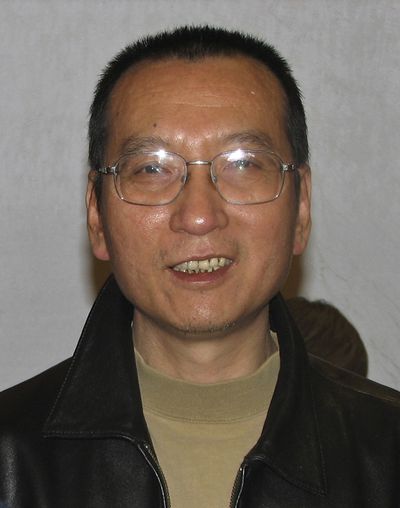Jailed dissident wins Nobel
China denounces award as blasphemy, suppresses news of peace prize

More than 12 hours after the announcement that an imprisoned dissident in China had won the Nobel Peace Prize, China’s domestic news media remained silent today on the subject, underscoring the Communist Party’s rage at so public a challenge to its authoritarian rule.
Chinese authorities blocked Chinese-language Internet searches and cell phone text messages about the award to Liu Xiaobo, who is the first resident Chinese citizen honored with what is arguably the world’s most prestigious prize.
How far China will go in the days ahead to ensure that most of its citizens never learn about Liu’s award remained an open question. There were reports on Twitter, accessible from China only with special software, that several Chinese who’d tried to celebrate the award in Beijing and Shanghai were carted off by police.
The award strikes at the heart of the way Beijing’s rulers usually handle the country’s small numbers of dissidents – monitoring, harassing, detaining and censoring them until the vast majority of Chinese don’t realize they even exist.
The Nobel committee said that by conferring the honor upon Liu, it intended to call attention to China’s human rights problems. Liu, a 54-year-old former university professor, has spent years in and out of Chinese jails for his dissident activities, beginning with the Tiananmen Square demonstrations in 1989.
His current 11-year prison sentence stems from his arrest in December 2008, shortly before the public release of a political manifesto he helped draft. The document, known as Charter 08, called for open elections, an independent judiciary and human rights guarantees. It was modeled on Charter 77, a Czech pro-democracy essay during Soviet rule that formed the foundation for the later Velvet Revolution.
“China’s new status must entail increased responsibility,” said the statement from Oslo. “China is in breach of several international agreements to which it is a signatory, as well as of its own provisions concerning political rights.”
The Chinese Foreign Ministry denounced the award as “blasphemy.”
“Liu Xiaobo is a criminal who has been sentenced by Chinese judicial departments for violating Chinese law,” said the statement, attributed to Foreign Ministry spokesman Ma Zhaoxu.
The news was widely welcomed abroad, however. President Barack Obama called on China “to release Mr. Liu as soon as possible.”
Reached by phone Friday, Liu’s wife, Liu Xia, said she had one hope about the prize: “It means my husband will come home earlier.”
As for Liu Xiaobo himself, she said, “it means over 20 years of persistence have been recognized. … Other dissidents’ work will be recognized too. They will be encouraged by this.”
The Nobel is a powerful test for officials in Beijing, who usually clamp down hard on any sign of dissent. In the months leading up to the award, at least one Chinese official tried to pressure the Nobel committee into dropping Liu as a candidate, according to a Nobel committee official.
Any move to punish Liu or other activists further following the award of the peace prize could bring rebuke from across the globe.
“They’ve worked very hard to marginalize dissident voices and keep them outside of the mainstream,” said Larry Siems, international programs director in New York for PEN, a writers’ advocacy group whose president nominated Liu for the award. “But there’s nothing more mainstream than the Nobel Peace Prize.”
The first mention of the award on Xinhua was a one-sentence warning Friday by the foreign ministry that the award could harm relations between China and Norway.
Chinese authorities scrubbed online commentary about Liu on Chinese websites and blocked transmission by foreign TV outlets when the award was announced. An article repeating Foreign Ministry assertions that Liu is a criminal was available in English on the state news agency’s website, but only through the search function.
Liu is the first resident Chinese citizen to receive the Peace Prize – exiled Tibetan spiritual leader the Dalai Lama won it in 1989 – but it wasn’t clear when or if he’d find out. His wife said that as of early evening, Liu Xiaobo hadn’t been notified in his prison cell.
After hearing that Liu had won, Chinese observers and activists hailed the award as a potential landmark.
“It’s a huge boost to those who are basically isolated,” said Bao Pu, who leads a publishing house in Hong Kong that’s printed political works that are banned in the mainland. “The government of China had done everything in the past to deny their voices.”
Liu’s attorney, Shang Baojun, told CNN on Friday that the award could extend his prison time.
“I hope that he’d be released earlier because of the prize, but in reality, that will not happen,” he said.